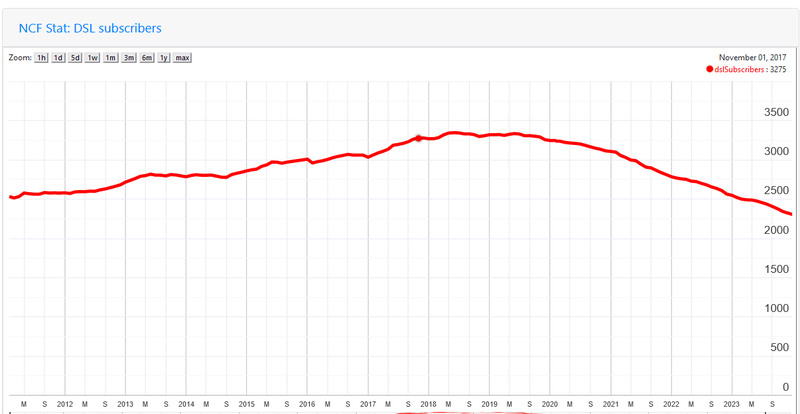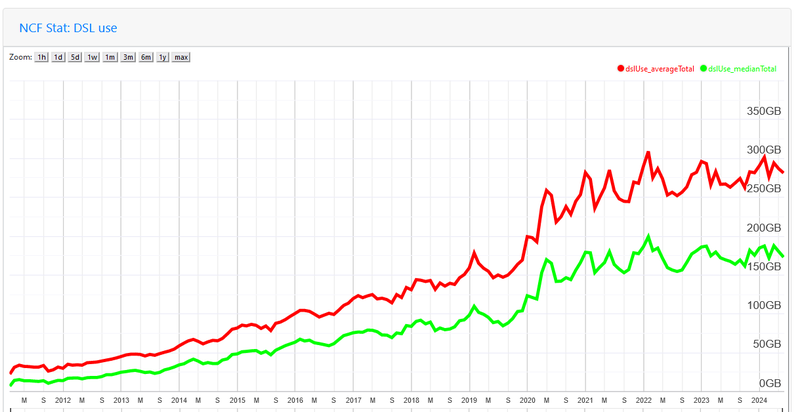Report from the Executive Director (Shelley Robinson)
Introduction:
The last few years have really laid bare the extent of the digital divide while simultaneously making it tougher for us to bridge it. These are systemic challenges, and we won’t be able to change things all on our own.
We’re doing our part by serving as a model for how communities can take control of essential services, by advocating to the CRTC and government, by joining forces with like-minded partners, and by tweaking our existing services and trying new things.
Looking back at NCF history, that is a throughline: we’re small, but when it counts we have been nimble at adapting, from dial-up to DSL to fibre and now also community WiFi. Thanks as always for joining us on this journey!
Summary:
- NCF has lost more than 1000 DSL member-subscribers since our peak in 2019
- Cable internet services have grown but not enough to make up for the losses in DSL
- We made additional network investments to ensure network resilience and redundancy and plans to continue this work into 2024
- Member donations were down because the renewal reminder email system was broken, we expect to bounce back: these donations help support our digital equity work including the Community Access Fund
- We participated in the CRTC’s Review of the Wholesale Internet Policy, arguing for lower wholesale rates, dedicated funding to ensure everyone can afford home internet access, and wholesale access to Fibre-to-the-Home internet services
- We had a number of grants, including one focused on how to diversify our sources of revenue through social financing, and another focused on building back our award-winning volunteer program
- We also spent months working on a proposal for CIRA’s Net Good Program to build a free Community WiFi network and in December we were granted $250,000!
Services and Membership
Email and webhosting and dial-up
NCF’s Zimbra email services continued this past year, but we will need to look into upgrading it soon to ensure the best possible security protection, complicated by the fact that Zimbra is no longer available as a free and open-source software. Thank you to HelpDesk volunteer Michael Wong and HelpDesk staffer Albert Montano for making sure email tickets get the attention they deserve. And thanks to our System and Network Administrator Andre Dalle and Operations Manager Dylan Ferris for keeping things running smoothly!
We do also still maintain some basic webhosting, but changes to our network and website meant this service has lost its web stats functionality. Given the limitations of our webhosting software and other network priorities, coupled with the number of commercial providers for webhosting, we are maintaining this services largely for existing members. Similarly, dial-up services are now only being used by about 11 members.
DSL and cable internet
From a peak in 2019 of about 3350 DSL member-subscribers, we ended 2023 with 2306 DSL member-subscribers and 122 cable internet member-subscribers. That said, we have maintained the same investments in capacity to account for growth in member usage and to always ensure we have sufficient bandwidth during peak periods.
DSL members 2012-2023:

DSL usage 2012-2023:

HelpDesk
January brought a new full-time HelpDesk Analyst, Albert Montano, to the team as Luke transitioned to HelpDesk Management. Albert’s initial placement was funded by the Youth Employment and Skills Strategy, supported by the Social Planning Council of Ottawa. Albert has been a great addition to the team, and is now the HelpDesk’s Billing Lead.
We lost a number of our HelpDesk volunteers during the pandemic when we transitioned to remote-only work. This past year we kicked off a new program, thanks to some funding from the Ontario Trillium Foundation’s Resilient Communities Fund, to bring back our monthly staff and volunteer Lunch and Learns, and to re-design our volunteer recruitment and training plans for our new hybrid reality.
We ended the year with three very strong new volunteers: Oleh Replansky, John Nash and Lana Wilson. Thanks all three of you for your work on the HelpDesk and for helping us work out some new methods. And thanks Luke Deschenes for leading the work of recruitment and training which has already picked up a lot more speed in 2024.
The HelpDesk team has also been working to develop new efficiencies and service excellence standards.
Digital Equity and Advocacy
Community Access Fund
I’m happy to say that while there are always new members joining and leaving the lower-cost Community Access Fund, currently only available to Ottawa Community Housing tenants, the total number has remained relatively stable, ending 2023 at 307 member-subscribers.
We have long wanted to expand this program, extending eligibility to other folks living on low incomes and ideally also offering faster speeds for lower rates. Unfortunately, we have been held back by regulatory conditions. We’re hoping 2024 finally enables us to offer the program more widely.
Regulatory work
To help keep internet affordable, this past year we contributed a number of submissions to the CRTC’s hearing on wholesale internet policy, all available on our website: www.ncf.ca/advocacy
As part of that hearing, the Commission released an initial decision at the end of 2023 mandating temporary aggregated wholesale access to Fibre-to-the-Home networks, launching in early May 2024. This means that NCF now has the ability to order Fibre-to-the-Home services for our members!
We are currently beta testing these services, making network improvements to account for an expected increase in usage, and working on pricing. Unfortunately, the interim wholesale pricing is quite high and we are hesitant to offer a temporary service without some assurances about its future. The Commission has said they plan to release the final decision this fall, and we’re looking forward to finally being able to offer dedicated fibre services to the many members who have been asking for it.
We also participated in the CRTC’s hearing to review the Broadband Fund, their program to improve connectivity for those in rural, remote and Indigenous communities. Though most of our members live in urban areas, there is a chance this funding could help us connect some potential members in under-connected rural areas in our region.
Also, given that most funding for increasing broadband connectivity goes to billion-dollar incumbent providers like Bell, we also want to support other small, local and community-owned providers working toward digital equities in their communities.
Free Community WiFi Network
We first started developing our Community WiFi proposal in 2020 in response to the pandemic. Thanks to our partnership with the Social Planning Council of Ottawa and funding from United Way, as well as our ongoing partnership with Ottawa Community Housing, and additional funding from the federal Investment Readiness Program managed by the Ottawa Community Foundation, we worked out a lot of the kinks.
The timing was then perfect last summer when CIRA invited us to submit a proposal for the Community WiFi Network to celebrate the 10th anniversary of their Net Good grants program, which also funded us to start Digital Access Day in 2018.
By the end of the year we had secured a $250,000 grant to make this dream a reality! While the project initially focuses on Vanier, Overbrook and parts of Lowertown and Sandy Hill, we know how much it could help people across the region and hope to expand it over the next few years.
Thanks too to Hiboo Networks, a new partner who has committed free backhaul connectivity for the first 18-months of the project.
Financial sustainability
Breaking even from 2020 to 2022 felt like a real feat given all the financial pressures we faced during the pandemic: from a jump in usage and the CRTC flip-flopping back to higher wholesale prices to the return of inflation.
We shared this gift with members by keeping our prices the same since February 2021. In fact, in the 19 years NCF has been selling high-speed internet services, we have changed prices only a handful of times, and that includes price drops and offering unlimited usage for the same price we used to charge for a metered plan.
That said, we know that a lot of providers offer very attractive short-term discounts to build up their market share, jacking rates when people stop paying attention. It’s hard to compete.
That’s why we’re looking to continue offering the same or better services we do now, while also expanding our sources of revenue. Grants help. Donations help. But ultimately, NCF’s sustainability as a social enterprise relies on our ability to generate revenue through our work.
Conclusion
NCF has always worked to ensure that everyone has meaningful access to affordable internet, but that looked a lot different in 2023 than it did in 1993, when NCF first launched our services.
As members, we appreciate your support and also want your feedback to ensure we maintain the best parts of our current services as we develop new services. Please feel free to contact me at execdir@ncf.ca.
Thanks,
Shelley Robinson
Executive Director
National Capital FreeNet